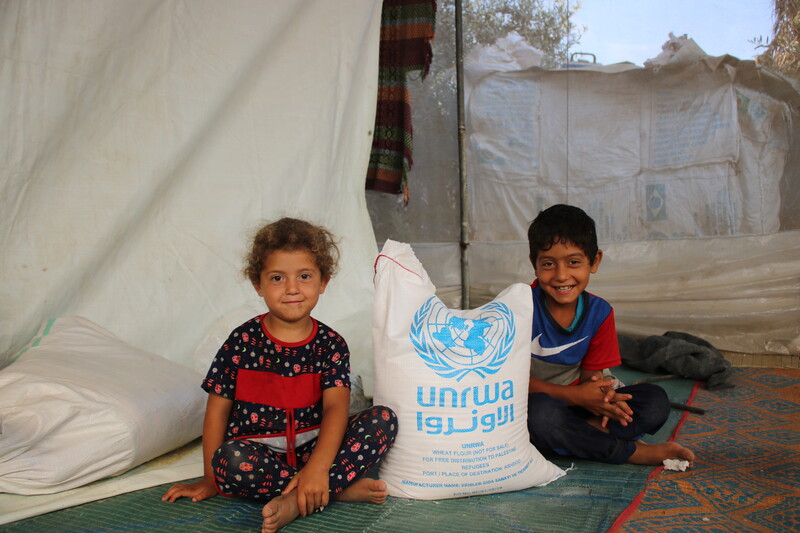The Electronic Intifada 27 August 2020

The Abu Amra family receives an aid package from the UN agency for Palestine’s refugees every few months.
The Electronic IntifadaMuhammad Abu Amra has diabetes and cannot afford treatment.
He needs two insulin injections per day; each costs more than $7. He gets the medicine on credit.
The debt he owes to two pharmacies is continuously rising.
Muhammad and his family live in the Deir al-Balah area of central Gaza. Their home is in poor condition. It has holes in the walls and ceiling.
During the summer, the temperatures have been unbearable. His five children have sustained numerous mosquito bites.
“I feel helpless and hopeless,” Muhammad, 33, said. “My responsibilities are growing but because of my health I cannot fulfill them. And the economic situation facing my family is very bad.”
Muhammad, who is unemployed, and his wife Mansoura have little money for groceries.
“Sometimes I have to get very basic items – diapers, tissues, salt and sugar – on credit,” Mansoura said. She is banned from one supermarket until she pays a $200 bill.
“Most of the meals I make for my children rely on the cheapest vegetables I can find – like potatoes and eggplants,” Mansoura added.
“We only eat red meat or chicken once every six months. My children don’t drink milk – I am really concerned that this will harm their health in the long term.”
Every three or four months, the Abu Amra family receives an aid packet from UNRWA, the UN agency for Palestine’s refugees. It consists of flour, rice and cooking oil.
According to Mansoura, the contents of the packet are generally used up within a month.
Variety shrinks
Malnutrition is a serious problem in Gaza, a recent study by the World Food Programme stated. It found that 86 percent of children under the age of 5 living near Gaza’s boundary with Israel did not have a minimal accepted diet.
The World Food Program reported, too, that 28 percent of lactating women in Gaza have depleted levels of iron.
An earlier report by the World Food Programme and other aid groups observed that people in Gaza had responded to the harsh economic situation by reducing the variety of food they eat.
More than 68 percent of Gaza’s two million people are considered as food insecure by the United Nations. Food insecurity has been defined as not having access to or being unable to afford enough nutritious food to lead a healthy and active life.
Malnutrition has been among the consequences of the tightened blockade Israel has imposed on Gaza. Human rights activists have documented how Israel devised a plan in 2008 aimed at reducing the amount of food available in Gaza.
Aziza al-Kahlout, a spokesperson for Gaza’s social affairs ministry, said that the surrounding problems have worsened in recent months. Restrictions imposed during the COVID-19 pandemic have led to greater unemployment.
“Many people lost their sources of income – like drivers who no longer have passengers and workers from factories and other businesses that have been closed,” said al-Kahlout. “All of them and their families need urgent support in these difficult times.”
As the authorities in Gaza are under financial strain, greater support is required from international donors “to stop the humanitarian situation from deteriorating,” said al-Kahlout.
At least 50 factories have closed as a result of the pandemic and approximately 4,000 jobs have been lost in Gaza, according to the Palestinian General Federation of Trade Unions.
Poor get poorer
Mahmoud al-Lili runs a stall selling snacks in Maghazi refugee camp. Before the pandemic, he earned at least $5 per day.
The 26-year-old sometimes makes less than $1 now. Business has plummeted since the Gaza authorities imposed restrictions in response to the COVID-19 pandemic earlier this year.
“I live with my parents, sisters and my married brother in a small house,” al-Lili said. “I try my best to make some money so we have something to eat for dinner. We are a poor family but the crisis has made us even poorer.”
Samir al-Sayid is 56 and has a number of health problems, including high blood pressure. His nine-member family share a two-room home in Bureij refugee camp.
“I do not work and I cannot meet my responsibilities toward my family,” Samir said. “We rely mainly on humanitarian aid to survive.”
UNRWA’s aid packages are essential for the family.
“When we get the package, I plan carefully how to get the most out of it and try to make it last for a long time,” said Siham, Samir’s wife. “I cannot buy the food for most of the dishes my children want me to cook. Cooking for my family is a constant nightmare.”
Isra Saleh el-Namey is a journalist from Gaza.





